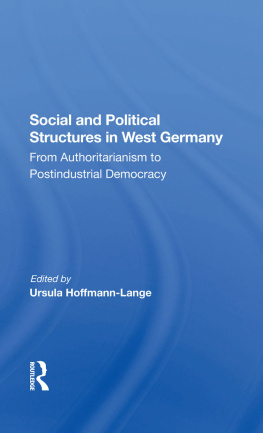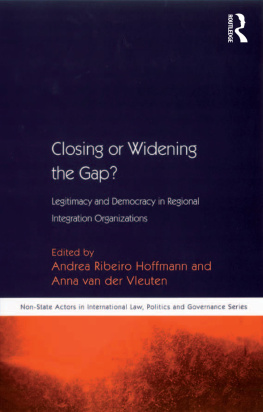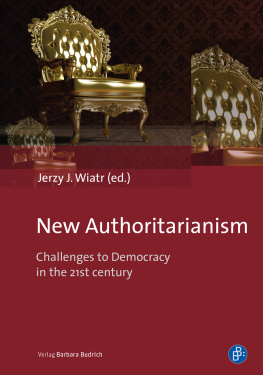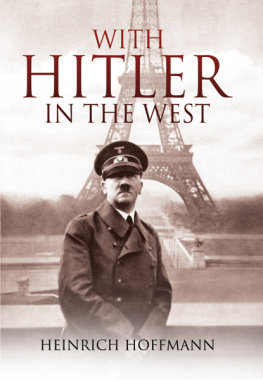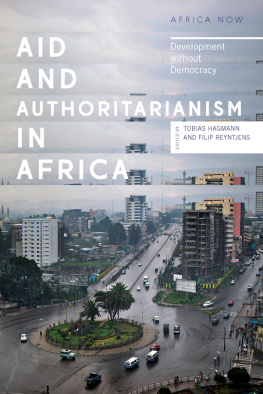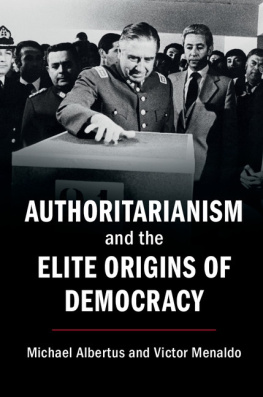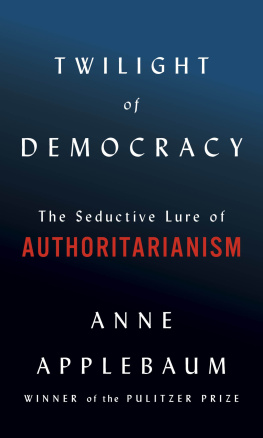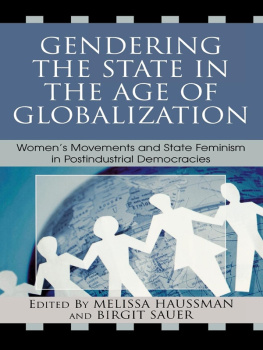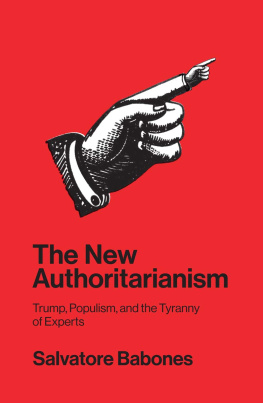Ursula Hoffmann-Lange - Social and Political Structures in West Germany: From Authoritarianism to Postindustrial Democracy
Here you can read online Ursula Hoffmann-Lange - Social and Political Structures in West Germany: From Authoritarianism to Postindustrial Democracy full text of the book (entire story) in english for free. Download pdf and epub, get meaning, cover and reviews about this ebook. year: 2019, publisher: Routledge, genre: Politics. Description of the work, (preface) as well as reviews are available. Best literature library LitArk.com created for fans of good reading and offers a wide selection of genres:
Romance novel
Science fiction
Adventure
Detective
Science
History
Home and family
Prose
Art
Politics
Computer
Non-fiction
Religion
Business
Children
Humor
Choose a favorite category and find really read worthwhile books. Enjoy immersion in the world of imagination, feel the emotions of the characters or learn something new for yourself, make an fascinating discovery.
- Book:Social and Political Structures in West Germany: From Authoritarianism to Postindustrial Democracy
- Author:
- Publisher:Routledge
- Genre:
- Year:2019
- Rating:3 / 5
- Favourites:Add to favourites
- Your mark:
- 60
- 1
- 2
- 3
- 4
- 5
Social and Political Structures in West Germany: From Authoritarianism to Postindustrial Democracy: summary, description and annotation
We offer to read an annotation, description, summary or preface (depends on what the author of the book "Social and Political Structures in West Germany: From Authoritarianism to Postindustrial Democracy" wrote himself). If you haven't found the necessary information about the book — write in the comments, we will try to find it.
Ursula Hoffmann-Lange: author's other books
Who wrote Social and Political Structures in West Germany: From Authoritarianism to Postindustrial Democracy? Find out the surname, the name of the author of the book and a list of all author's works by series.
Social and Political Structures in West Germany: From Authoritarianism to Postindustrial Democracy — read online for free the complete book (whole text) full work
Below is the text of the book, divided by pages. System saving the place of the last page read, allows you to conveniently read the book "Social and Political Structures in West Germany: From Authoritarianism to Postindustrial Democracy" online for free, without having to search again every time where you left off. Put a bookmark, and you can go to the page where you finished reading at any time.
Font size:
Interval:
Bookmark:
Ursula Hoffmann-Lange

52 Vanderbilt Avenue, New York, NY 10017
2 Park Square, Milton Park, Abingdon, Oxon OX14 4RN
Product or corporate names may be trademarks or registered trademarks, and are used only for identification and explanation without intent to infringe.
Social and political structures in West Germany : from authoritarianism to postindustrial democracy / edited by Ursula Hoffmann-Lange.
p. cm.(Westview special studies in West European politics and society)
Papers presented at a conference held at the University of Texas at Austin, fall 1986, sponsored by the German Academic Exchange Service and the College of Liberal Arts and Dept. of Government, University of Texas.
Includes bibliographical references.
ISBN 0-8133-8029-4
1. Germany (West)Politics and governmentCongresses. 2. Political cultureGermany (West)Congresses. 3. Social structureGermany (West)Congresses. 4. Germany (West)Economic policyCongresses. I. Hoffmann-Lange, Ursula. II. Deutscher Adademischer Austauschdienst. III. University of Texas at Austin. College of Liberal Arts. IV. University of Texas at Austin. Dept. of Government. V. Series.
JN3971.A2S62 1991
320.943'09045dc20
CIP
WEST GERMANY'S SOCIAL AND ECONOMIC STRUCTURE
VOTERS AND ELITES
POLITICAL CULTURE
POLICIES IN WEST GERMANY
Font size:
Interval:
Bookmark:
Similar books «Social and Political Structures in West Germany: From Authoritarianism to Postindustrial Democracy»
Look at similar books to Social and Political Structures in West Germany: From Authoritarianism to Postindustrial Democracy. We have selected literature similar in name and meaning in the hope of providing readers with more options to find new, interesting, not yet read works.
Discussion, reviews of the book Social and Political Structures in West Germany: From Authoritarianism to Postindustrial Democracy and just readers' own opinions. Leave your comments, write what you think about the work, its meaning or the main characters. Specify what exactly you liked and what you didn't like, and why you think so.

